| Srl | Item |
| 1 |
ID:
079602
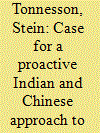

|
|
|
|
|
| Publication |
2007.
|
| Summary/Abstract |
The magnitude of the threat from climate change is starting to be realized by the world's political leaders. A positive aspect of such a threat is that it could unite the world behind a common purpose, but this will require a drastic change in policy, primarily in the United States and the growth countries in Asia. This article argues that India and China could turn the threat from climate change into a political advantage by adopting a new development strategy, based on a demand for full access to all such technologies that may allow to quickly surpass from the dirty stage of development. To develop a leapfrog strategy, however, Indian and Chinese analysts and policy makers need to acquire a profound understanding not only of science and technology but also of how the problems of climate change, energy security and political instability in West Asia (the 'Middle East') are related to each other. This will require a combination of knowledge from several academic disciplines.
|
|
|
|
|
|
|
|
|
|
|
|
|
|
|
|
| 2 |
ID:
106560
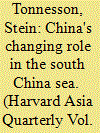

|
|
|
| 3 |
ID:
089203
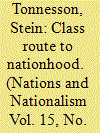

|
|
|
|
|
| Publication |
2009.
|
| Summary/Abstract |
This essay explores the proposition that China and Vietnam represent a fourth class route to modern nationhood, in addition to the ethnic (German), civic (French) and plural (American) routes. Nation-states emerging along the class route are characterised by an exclusive membership based on social class rather than just ethnicity, living under the same laws or participation in liberation from foreign rule. The essay compares China's and Vietnam's class-based nationalism with the more inclusive labour movement nationalisms of Norway and Cyprus. Then it explains how the class route differs from the French civic route. In the conclusion, the author concedes that the Chinese and Vietnamese class route is perhaps a detour rather than a route of its own, since it leads to inevitable tension between the divisive history of how the nation was formed and the need of its later leaders to include and represent the same social classes that were originally excluded. These leaders and their national storytellers are forced to undertake a redefinition of the national self as ethnic, civic and/or plural in an attempt to recreate national legitimacy, often in competition with more radically nationalist opposition groups.
|
|
|
|
|
|
|
|
|
|
|
|
|
|
|
|
| 4 |
ID:
050929
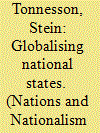

|
|
|
|
|
| Publication |
Jan-Apr 2004.
|
|
|
|
|
|
|
|
|
|
|
|
|
|
|
|
| 5 |
ID:
122193
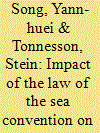

|
|
|
|
|
| Publication |
2013.
|
| Summary/Abstract |
This article examines the impact of the UN Law of the Sea Convention on conflict behavior and management in the South China Sea during four periods: during its negotiation (1973-1982); from its signing to the entry into force (1982-1994); from then until the China-ASEAN Declaration on the Conduct of Parties in the South China Sea (1995-2002); and from the setting of a timeline for outer limits of continental shelf submissions to the events following the 2009 submissions (2003-2013). Ambiguous effects were found. On the one hand, the Convention has generated or exacerbated conflict by raising the stakes, failing to resolve key legal issues, and encouraging overlapping zone claims. On the other hand, it has provided obligations, language, and techniques for conflict management and resolution. The conflict-enhancing impact was found to have been more substantial than the peace-promoting effects. Nevertheless, the balance has shifted toward more emphasis on conflict management and also some utilization of the Convention's peacemaking potential. If this long-term trend continues and the Convention is more rigorously respected and applied, the Convention may in the end be found to have contributed to regional peace.
|
|
|
|
|
|
|
|
|
|
|
|
|
|
|
|
| 6 |
ID:
140406
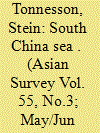

|
|
|
|
|
| Summary/Abstract |
The article looks at three ways in which international law has affected government behavior in the South China Sea. It has exacerbated disputes. It has probably curtailed the use of force. And it has made it difficult to imagine solutions that violate the law of the sea.
|
|
|
|
|
|
|
|
|
|
|
|
|
|
|
|
| 7 |
ID:
088923
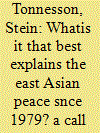

|
|
|